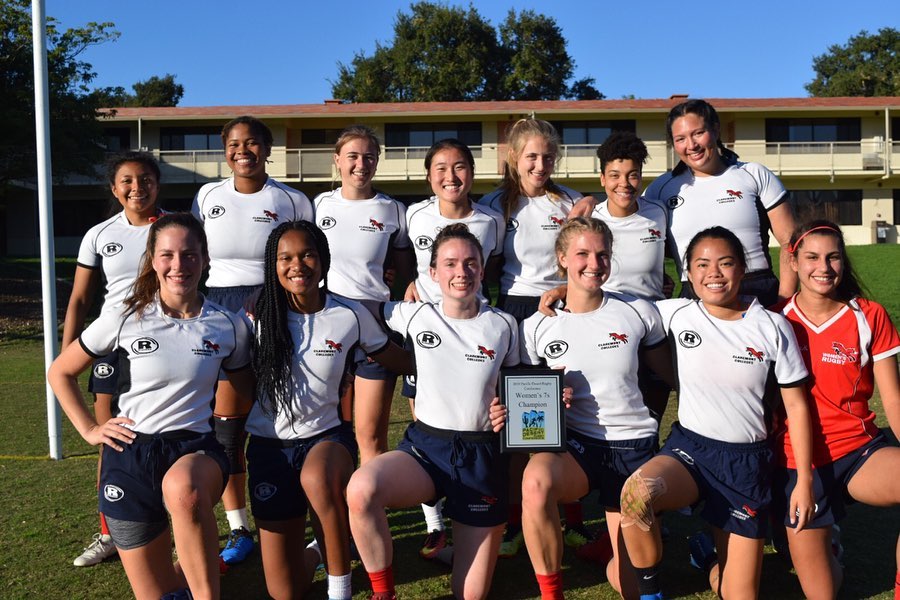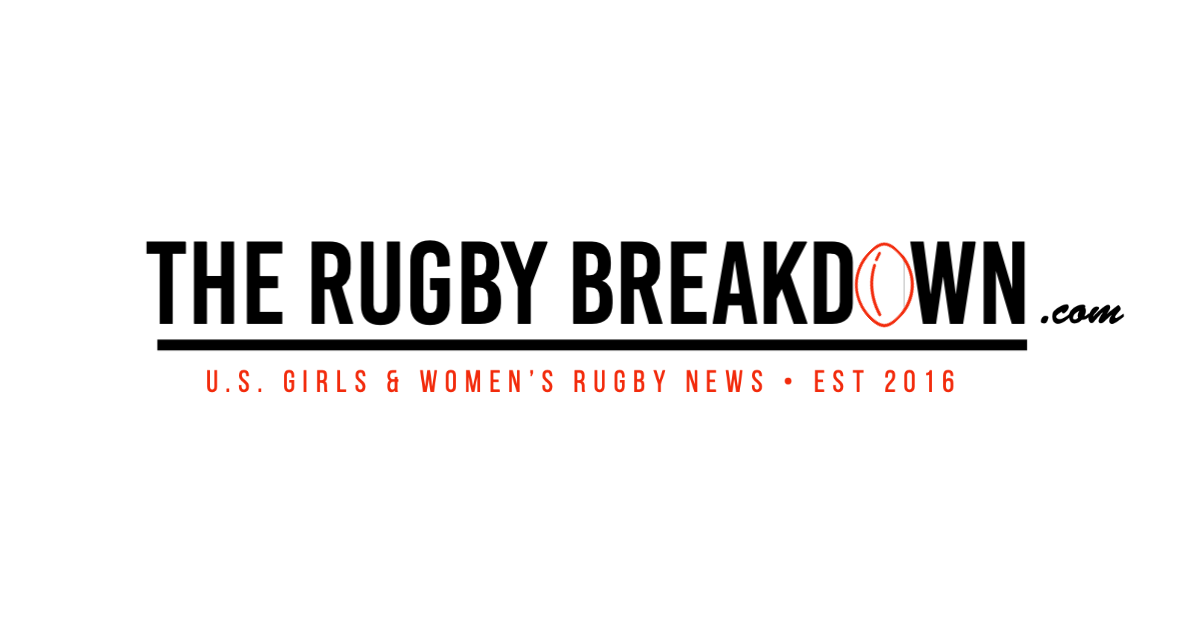
Claremont booked its spot to 7s nationals already.
Now that USA Rugby has named its Division I (Air Force) and Division II (Winona State) fall champions, it’s time to shift focus to leagues building toward the spring championships. Several conferences contest split seasons – i.e., regular-season games occur in the fall and spring – so teams are starting to emerge, and two teams have already secured their spot to the spring regional championships.
DIVISION I
Blue Ridge (formerly Mason-Dixon) plays a split season but the conference doesn’t maintain a public resource, so it can be difficult to distinguish between matrix games and friendlies, since teams will often play each other in the fall and spring. That said, Virginia Tech has re-established itself as the team to beat, allowing just one try against in its matrix wins against USC, NC State and Clemson, while scoring 234 points. The Hokies also retained the Commonwealth Shield – the annual in-state match against UVA – but that game was not a matrix match. Member teams include Clemson, East Carolina, James Madison, North Carolina State, Univ. North Carolina, Univ. South Carolina, Virginia Tech, Virginia Women’s Rugby (UVA).
Florida looks like a four-team, home-and-away series between Central Florida, Florida, Florida State and South Florida. Games begin Jan. 25. Of note, UCF, the longtime leader in the state, is currently slated for a second team in the Florida DII league.
The Pacific Desert has gained an eighth member in BYU, the reigning DI spring champion, and begins league play on Jan. 11. Member teams include Arizona, Arizona State, BYU, CSU Northridge, Grand Canyon, UC San Diego, UC Santa Barbara and UCLA.
Pacific Mountain North contested 3/8 of its season in the fall, and Western Washington leads the standings at 3-0, most notably beating Washington State 48-3 in Pullman. The league has returned to five teams after losing Boise State and includes Oregon, Oregon State, Washington, Washington State and Western Washington.
Pacific Mountain West begins on Jan. 18 and has swapped one Californian team for another. Reigning DII spring champion Fresno State has replaced Humboldt State (now competing back in the DII West Coast conference), and joins returners Cal, Chico State, Stanford and UC Davis. All teams play each other home and away. • The league also held its USA Rugby College 7s National Championship automatic qualifier, and Cal took home the title. Read more.
The Allegheny, Big 10, Midwest, Northeast, Rocky Mountain and Texas conferences, as well as independents like Davenport, Navy and Princeton, play toward the fall 15s championship.
DIVISION II
Capital contests its regular season and playoffs in the fall, and conference champ Salisbury has guaranteed its spot in the DII Spring Regional Championships, which begin April 2020. The league typically receives more than one berth to regionals, so runner-up William & Mary should be readying for the post-season run as well.
The Carolinas conference has not released any information on its 15s season, although matrix games have been played already. The most significant result was College of Charleston’s 27-19 win over UNC Charlotte. Additionally, Appalachian State shut out UNC Greensboro 56-0.
This league has been unwieldy the last few years. There have been some natural fluctuations in strength among programs, while other teams are either transitioning to an elevated status on campus or registered as NSCRO teams.
Cascade hasn’t fielded a DII league in recent years (but has been active in NSCRO), and conference commissioner Amanda Quiles supplied the following update:
Cascade has a mixture of teams playing 15s and 7s. Some teams will be moving from playing 7s in the fall to 15s as they were able to recruit quite a few players in the fall. Our spring season should pick up in around mid-February with Cascade NSCRO Championships for 7s and 15s taking place around the beginning of April. Location is currently TBD.
Cascade is rooted in the Pacific Northwest and has not supplied a team to DII regionals since 2017, when both Western Washington (now in the DI Pacific Mountain North) and Eastern Washington competed.
Florida has four teams, one of which is UCF’s second side. Reigning champion Eckerd is joined by Florida International and Florida Gulf Coast in regular competition, which begins Feb. 1. Florida Atlantic appears to be absent, same with Miami.
Mid-America plays a split season and its standings lists seven teams, but the current schedule is incomplete, and teams like John Brown have no players CIPPed. The competition did gain Pittsburg State (read more), which played a warm-up season last year before joining the conference. The Kansas team is currently 2-0 and beat Kansas State 29-5 in November. Member teams include Benedictine, Central Missouri, John Brown, Kansas State, Missouri, Pittsburg State and Truman State. No sign of previous members like Arkansas and Nebraska-Lincoln, but smaller programs like Washington Univ. (Mo.) are still functioning, just not in league.
The Pacific Desert has added San Diego State, which joins returners Claremont, Long Beach State, MiraCosta, Occidental, UC Irvine and UC Riverside in regular-season play. The season begins Jan. 18. • The league also held its automatic qualifier for the USA Rugby College 7s National Championship, and Claremont will take the DII berth.
The South Independent Rugby Conference (SIRC) contests its season in the spring, but the competition shifts every year, as teams come and go and organizers attempt to unite a large, disparate geographic region. Only five teams are competing and eligible for post-season play – Georgia Tech, Kennesaw State, University of Georgia, Alabama, and Univ. Tennessee-Chattanooga – and Life University is supplying a JV side to the league so everyone gets their requisite number of games. The season begins Feb. 1 and features double-header, tournament-style weekends, where multiple teams report to a single location. New SIRC commissioner Jess Mallindine adopted this format to mitigate teams’ travel expenses.
Mallindine is also the head coach for Tulane, which is abstaining from the 2020 league.
“Tulane is taking a break from the national rugby competitive circuit and re-focusing on development, regional growth, and fun,” Mallindine explained. “While they have enjoyed participating, the last four years have been a lot on them as a program. It is time to refocus on regional development and growth.”
West Coast got started in mid-November, a necessity since all 10 teams play each other in the regular season. San Jose State and UC Santa Cruz are currently 2-0, and Cal Poly is 1-0 after its 33-12 win over Nevada. League members include Cal Poly, CSU Monterey Bay, Humboldt State (which played in DI the last few years), Nevada, Sacramento State, Saint Mary’s College, San Jose State, Santa Clara, UC Santa Cruz and Univ. San Francisco.
The Allegheny, Great Lakes, Great Waters, Illinois, Mid-Atlantic, New England Wide, Northern Lights, Ohio Valley, Rocky Mountain, Rugby Northeast, Tri-State and Upstate New York conferences compete toward the fall 15s championship.


